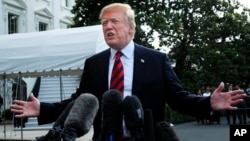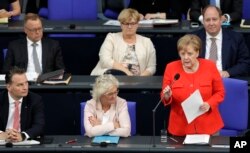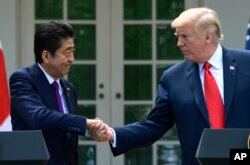Russia should be invited back to the summits of leading advanced countries, U.S. President Donald Trump told reporters as he departed the White House for the Group of Seven meeting in Canada.
Trump, speaking on the South Lawn before boarding the Marine One helicopter, said that while “I have been Russia’s worst nightmare…Russia should be in this meeting.”
One other G-7 leader, Italian Prime Minister Giuseppe Conte, said in a tweet he supports Trump’s suggestion.
But a spokesman for the host of this year’s summit, Canadian Prime Minister Justin Trudeau, said Canada remains opposed to re-admitting Russia.
A spokesman at the Kremlin, Dmitry Peskov, brushed it all off.
“Russia is focused on other formats apart from the G-7” Peskov said, according to the Sputnik news agency.
Russia was added to the political forum in 1997, which became known as G-8 the following year. But Russia was suspended from the summit of the top industrialized nations in 2014 after its annexation of Crimea, a part of Ukraine. Russia announced its permanent withdrawal last year.
Trump says he hopes to resolve what he considers unfair trade agreements with U.S. allies during his time at the G-7 summit in Quebec on Friday and Saturday.
"Looking forward to straightening out unfair Trade Deals with the G-7 countries. If it doesn't happen, we come out even better," Trump wrote Friday on Twitter, before leaving the White House.
America’s closest allies are prepared to confront Trump over metals tariffs he imposed on Canada, Mexico and the European Union.
The issue is certain to be raised when Trump holds separate meeting in Charlevoix on Friday with French President Emmanuel Macron and Trudeau.
On the eve of the summit, Trump lashed out on Twitter at Macron and Trudeau, who earlier Friday criticized Trump’s trade stance a joint news conference in Ottawa. The White House then announced Trump would skip some of the G-7 sessions.
“The president will travel directly to Singapore from Canada in anticipation of his upcoming meeting with North Korea’s leader Kim Jong Un Tuesday," White House Press Secretary Sarah Huckabee-Sanders said in a statement.
Even before these developments it had become clear that this would be one of the more contentious G-7 meetings in memory.
Trump’s administration last week announced an end to exemptions from steel and aluminum tariffs that had been granted the Canada, Mexico and the EU.
Trump took the action on the grounds that weak domestic industries could affect U.S. national security.
Canada, Mexico and the EU have separately announced retaliatory tariffs.
The Trump administration has also been engaged in contentious talks with Canada and Mexico to renegotiate the North American Free Trade Agreement (NAFTA).
German Chancellor Angela Merkel has predicted the G-7 talks will be heated because of the American stance on trade.
Before arriving in Canada, British Prime Minister Theresa May called on fellow EU leaders to take proportionate responses to the U.S. tariffs and shrugged off a rebuff by Trump for a formal one-on-one meeting at the G-7.
“What worries me most is that the rules-based international order is being challenged," Donald Tusk, the chairman of European Union leaders, said at a news conference just prior to the start of the G-7 talks. "Quite surprisingly not by the usual suspects, but by its main architect and guarantor - the United States. Naturally we cannot force the U.S. to change its mind.”
Other G-7 leaders may also choose to be less confrontational with Trump.
Japanese Prime Minister Shinzo Abe met Thursday with Trump at the White House, where the focus was Trump’s unprecedented meeting with North Korean leader Kim Jong Un, scheduled for Singapore next week.
Conte, a political novice, was just sworn in last Friday, leading a coalition of far-right and Euro-skeptic parties. The Italian leader could turn out to be one of the friendliest faces for Trump at the G7 summit in Charlevoix, as his new populist government also stands for protectionist trade policies.











